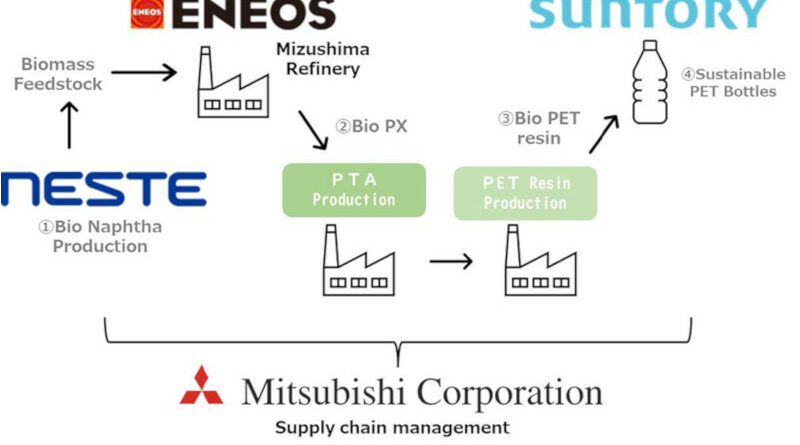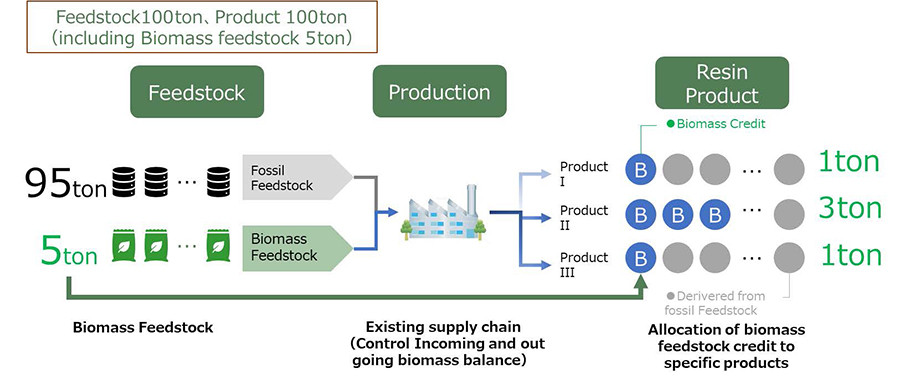Building a sustainable PET bottle supply chain – The world’s first initiative for Bio-Paraxylene origin “Biomass to PET bottles”
Mitsubishi Corporation is pleased to announce that MC, Suntory Holdings Limited and Eneos Corporation have reached an agreement to build a supply chain for sustainable PET bottles derived from biomass *1 such as used cooking oil applying a mass balance approach*2 to allocate bio-based materials. The supply chain is as follows, and bio-based feedstock supplied by NESTE will be used as a raw material to replace fossil naphtha.
- NESTE will supply bio-based feedstock produced from to replace fossil naphtha. manufactures bio-naphtha from biomass resources such as used cooking oil. Neste uses 100% renewable raw materials such as waste and residue oils and fats, e.g. used cooking oil.
- Eneos manufactures bio-paraxylene (PX)*3 derived from bio-naphtha at its Mizushima Refinery (Using the mass balance method in the production of Bio PX)
- Production of bio-high purity terephthalic acid (PTA)*4 and resin for bio-PET bottles (PET resin) using bio-PX
- Suntory utilises the bio-PET resin to produce sustainable PET bottles for its products
- MC is responsible for the management of the entire supply chain mentioned above.
This is the world’s first*5 production of sustainable PET bottles using bio-PX derived from bio-naphtha on a commercial scale. By the end of 2023, Bio PX equivalent to approximately 35 million PET bottles will be produced, which will be used as a raw material for Suntory’s sustainable PET bottles in 2024.
MC believes the usage of biomass for PET bottles, together with further development of the recycling system, will play an important role in the realization of a low-carbon and decarbonized society as well as in reducing dependency on fossil resources.
For PET bottles, ethylene glycol (MEG), which accounts for about 30% of the main raw material of PET resin used for PET bottles, has been produced from biomass since the past, while the remaining approximately 70% high-purity terephthalic acid (PTA) derived from paraxylene (PX) had not been converted to biomass on a commercial scale.
Through the development of this supply chain, MC will contribute to the reduction of CO2 emissions in comparison with conventional petroleum-derived products *6 by introducing PET resin produced from bio-PX.
MC will continue its efforts to convert various fossil fuel-derived plastics to bio-based plastics for the realization of a low-carbon and decarbonised society.
Explanations:
*1 A concept that expresses the quantity (mass) of biological resources (bio), i.e., organic resources (excluding fossil resources such as oil and coal) derived from animals and plants that can be recycled into energy and materials. Specifically, used cooking oil, etc.
*2 A process that tracks the amount and sustainability characteristics of biomass and enables allocation of such to a specific portion of the product in proportion to the input of the biomass raw materials, when biomass and non-biomass are mixed within the manufacturing and distribution of products.
*3 Paraxylene (PX) is used as a raw material for high-purity terephthalic acid (PTA), a raw material for polyester fibers and PET bottle resin conventionally manufactured from petroleum-derived naphtha.
*4 Purified terephthalic acid (PTA), a raw material for PET bottle resin, produced by oxidizing paraxylene (PX). PET bottle resin is produced by reacting PTA with ethylene glycol (MEG).
*5 As of July 31, 2023, on a commercial scale basis (according to our research).
*6 Based on a joint survey by Eneos and Wastebox Co., Ltd. Using data from 2021 and information received from the biomass manufacturer.


